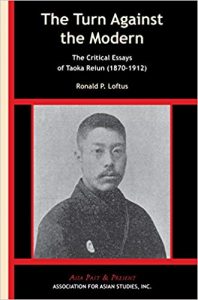 Taoka Reiun (1870-1912) was a literary critic and thinker who was active from the early 1890s in Meiji period Japan. Not satisfied with the meaning of bunmei kaika (“civilization and enlightenment”), the trajectory that the government had mapped out for the modernization of the country, he called on his readers to question its premises and promises. He found himself drawn to the philosophy of Arthur Schopenhauer, but at the same time he turned to ancient Indian and Chinese thought, from the Upanishads to Zhuangzi’s essays.
Taoka Reiun (1870-1912) was a literary critic and thinker who was active from the early 1890s in Meiji period Japan. Not satisfied with the meaning of bunmei kaika (“civilization and enlightenment”), the trajectory that the government had mapped out for the modernization of the country, he called on his readers to question its premises and promises. He found himself drawn to the philosophy of Arthur Schopenhauer, but at the same time he turned to ancient Indian and Chinese thought, from the Upanishads to Zhuangzi’s essays.
In The Turn Against the Modern: The Critical Essays of Taoka Reiun (1870-1912) (Association for Asian Studies, 2017), Ronald Loftus, professor of Japanese language and East Asian History at Willamette University, retraces Taoka Reiun’s personal and professional life from the point of view of the historian. But the book is much more than just a biography, as it also touches upon some of the major themes of the intellectual debate in Meiji Japan, from the notion of “modernity” to Japanese conceptions of the “self”. Loftus focuses on what he calls Reiun’s “intriguing and bold stance” of challenging modernity as the triumph of a utilitarian view of the world and of arguing instead for a truer, deeper portrayal of the human experience.
The book – the result of a long and challenging process which lasted for more than 40 years – represents a powerful homage to one of the most important “forgotten thinkers” who helped shape the intellectual landscape of modern Japan.